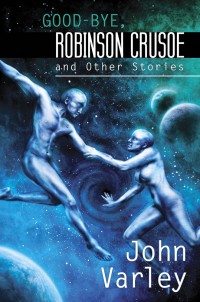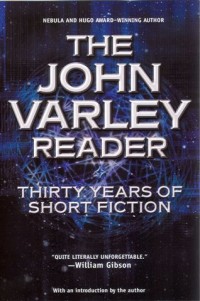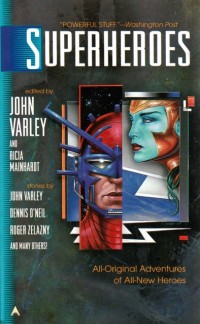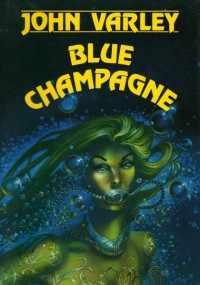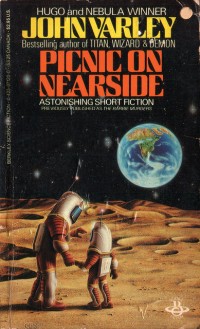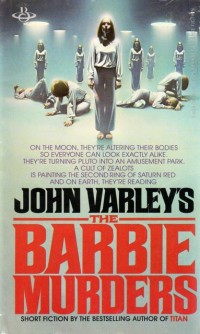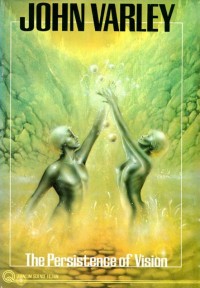Collections
And the Hugo Goes to … Introduction
I grew up in the little town of Nederland, Texas, squeezed between Beaumont and Port Arthur like a pimple full of petroleum. I hated it. (Sorry, Nederland, it’s the truth.) The main attractions of that area, known as the Golden Triangle (Orange is the third point), were humidity, hurricanes, mosquitoes the size of Nazi dive bombers, and a perpetual petrochemical stink from the five giant refineries in the county.
Nederland was all-white. All the black people in the area lived in Beaumont’s or Port Arthur’s niggertowns. (I have to use that word that we are never supposed to utter or write or even know these days, because “N-Word Town” or “Racial Epithet Town” just doesn’t tell you how really vile it was.)
Through some mistake made by the stork in 1947, I was destined to be a Big City Boy who had to grow up in a small town. The local “big city” is Houston, 93 miles away, and Houston is just more sweat, storms, skeeters, and stink. New Orleans is 277 miles away. Dallas is more cosmopolitan than Houston, but it’s 298 miles to Big D. Los Angeles is approximately 4.3 light-years from Nederland, and New York City about the same. I got out of there pretty much the day after I graduated, and have only been back a few times for a day or two, and that only because I had relatives there.
My chief escape from the place in the days when I was too young to physically leave came in 1960, when Arthur Green, the librarian at C.O. Wilson Junior High, handed me a book by Robert A. Heinlein, titled Red Planet. It was a well-worn copy, already over a decade old, and it was in a library binding, but it had the wonderful Clifford Geary illustrations. (I didn’t need pictures in a novel, but it didn’t hurt.) My life changed that evening as I read it from cover to cover. And again the next day. Without that book … well, there’s really no telling what my life would have been like, but I can’t imagine it could have been any better. So thanks, Mr. Green. I kept in contact with him right up to his death a few years ago.
Science fiction was a difficult habit to support at that age. I quickly went through all the novels in the C.O. Wilson library, and the children’s section of the Port Arthur and Beaumont libraries. I then scoured the entire adult fiction sections, book spine by book spine, looking for likely titles because I didn’t know the names of any authors. There weren’t many.
The age of the pulps was over, but there were still a few magazines on the newsstands. (Remember newsstands?) Every month I had to scrounge up 50¢ each for copies of Galaxy and Analog, 40¢ for The Magazine of Fantasy and Science Fiction, and 35¢ each for Worlds of If, Amazing, and Fantastic. That’s $2.45, which is about $24,500 in 2019 money. I had to mow a lot of lawns. (Luckily, lawns grew fast in the Texas Gulf Coast climate.) (Well, it didn’t seem lucky at the time, working up a sweat in the 90 degree heat and 90% humidity.)
Then there was the matter of paperback books. Most of them sold for 35¢, but a few were up to 40¢, and by the time I graduated some of them were going for an outrageous 75¢! And there were a lot of them, and I had to have them all. So what was a hopelessly addicted Texas boy to do?
Shoplift, that’s what. For the first and only time in my life I stole things that didn’t belong to me. Mostly it was from a little grocery store called O’Bannion’s, an easy bike ride from my home. Every time I stuffed a 35¢ Ace Double Novel down the front of my jeans and headed for the street I fully expected to feel the hard hand of Mr. O’Bannion on my shoulder and to be thrown in the back of a police car, disgracing my family, making me unfit for decent human company, and forever ruining my chances of going to the Massachusetts Institute of Technology. The theft would go on my permanent record!
But one half of that Ace Double was Secret Agent of Terra, a new short novel by John Brunner! I simply had to have it, even at the risk of having my girlfriend dump me, my friends abandon me, and my family throw me out into the street. (Some years later I had dinner in Paris with John and his wife, Marjorie. That’s Paris, France, not Paris, Texas. They were wonderful, charming company. And John had read my books! I didn’t tell him I had stolen his.)
I’m not sure how many books I boosted from O’Bannion’s and a few other stores. Thirty? Forty? My bowels froze every time, but I kept doing it until my best friend, hard-luck Calvin Stanley, got caught the first time he tried shoplifting. He was not abandoned by his family, but he was grounded for a month.
So I stopped. I have felt guilty about it for about fifty years now, even thought about going back and paying for the books (which would come to about $240,000, with interest) but the store has changed hands several times. I’m sure the current owners would think I’m crazy. It’s the Helena Drive-In now, a Mobil gas station/convenience store. Discount tobacco, beer, and wine.
* * *
As I said, New York was an impossible distance from my home. I had the vague idea that the magazines and books were published there, and that people called editors chose the stories. I became aware that there were things called “science fiction conventions,” where all these writers and readers got together from time to time. There was news of some of these gatherings in the magazines. None of them were happening in Houston, which was as far as I was allowed to drive Dad’s 1960 Pontiac with the 389c.i. engine. (It would go120 mph. I checked.) I probably couldn’t have afforded the admission, anyway.
At some point it seeped into my consciousness that there were these things called Hugo Awards, which were given out at the World Science Fiction Convention, the Worldcon, held in a different city every year. All of those cities were at least one or two parsecs away. Once it was in London, which was in another galaxy entirely.
I probably first learned of the Hugos from a book cover, most likely Alfred Bester’s The Demolished Man, or Robert A. Heinlein’s Double Star or Starship Troopers. HUGO AWARD-WINNING NOVEL!, the cover blurb would have announced.
Others Best Novel winners which I read at that time were A Case of Conscience by James Blish, The Big Time by Fritz Leiber, and A Canticle For Leibowitz by Walter M. Miller, Jr. By the time Heinlein’s Stranger in a Strange Land came along, I was pretty familiar with the award, and even knew what it looked like. From the very first one in 1953 right up to the present day the prize itself has varied hardly at all, being a slim silver rocket ship with four fins. (It is known, irreverently, as the steel suppository or the silver dildo.) The base is different for every year, but that rocket is a constant.
Back then, I could not have possibly imagined that I would one day be given that award.
Well, that’s a lie, of course. I could imagine it all I wanted. I could also, and did, imagine myself being the first Texan to land on Mars. I could imagine myself formulating a Grand Unified Field Theory, bringing together the equations of Einstein with the quantum mechanics of Max Planck, but I’d probably have to learn calculus first, and I never did. I could imagine myself marrying Claudia Cardinale or Ann-Margaret. (Actually, marriage didn’t really enter into that imagining, but I don’t want to get too X-rated here.) Any of those things seemed about equally as likely as me winning a Hugo.
But I gave it a shot. I wrote a four-page story, pecking it out painstakingly on a borrowed typewriter. I can’t recall anything at all about that story. I sent it off to Mr. H.L. Gold, the editor of Galaxy, my favorite magazine at that time. He sent it back with a form rejection slip, and he had written at the bottom: “Nice try, but not quite.”
You think I was disappointed? Not a bit! Those five words, from a man who lived in New York City and edited the finest magazine in the world, just had me walking on air. I’d have framed that rejection slip and hung it on the wall if I could have afforded a frame. Of course, all my money was going to books and magazines.
I later learned that Gold suffered from severe agoraphobia. For twenty years he edited the magazine from his apartment, which he never left. Most of his contact with people was by mail and telephone.
Years passed. I kept reading but didn’t write any more stories. I graduated high school. I did well on the SATs, and a few institutions of higher learning offered me full National Merit Scholarships. (M.I.T rejected me: No calculus.) Michigan State University was the one most distant from Southeast Texas, so I went there, and learned what winter was all about.
Things were happening in the world outside academia, which never appealed to me much, anyway. Dr. Timothy Leary counselled us to “Turn on, tune in, drop out.” I did it backwards, dropping out, then tuning in to the new groove, and finally turning on to LSD. It was … interesting, but not my bag. I stopped reading science fiction for eight years. I was too busy looking for America, as Paul Simon sang. I looked everywhere, crisscrossing the country several times while avoiding the tear gas, the draft, and Texas.
Then one day I stumbled across a paperback copy of Larry Niven’s Ringworld, and got hooked all over again. (It was the infamous first edition, where Larry has the Earth rotating the wrong way.) There was new, exciting stuff being done in the field. I had largely missed the New Wave, but these stories resonated with me. Larry didn’t know it, but he had changed my life as surely as Mr. Green did. A few years ago I finally got the opportunity to thank him.
What the hell. Maybe I’d give it another shot. Maybe I could write stuff like this new stuff.
Turns out I couldn’t, at least not at first. I wrote a novel in longhand with a ballpoint pen, typed it up with two smudgy carbons, and sent it to six publishers in a row. None of them thought it was a potential Hugo winner. None of them thought it was even publishable, actually. And they were right. It stunk. It could have been used in a classroom as a frightening example of all the things a beginning writer should not do.
So I retreated, made a more modest attempt at a novelette. It was 10,000 words long … and Mr. Ed Ferman at F&SF bought it! He sent a check for $200. Even then, 2¢/word didn’t seem like much (it was about what magazines were paying in 1939), but who cared? In due time I was holding a copy of a magazine with a story of mine in it. F&SF, August 1974, just in time for my 27th birthday. And if you think reading science fiction is addictive, let me assure you, publishing it is an order of magnitude better.
I couldn’t have known it at the time, but I was started down the road that would lead to me accepting one of those silver rocketships. I would prefer that to being the first Texan on Mars or marrying Ann-Margaret any day.
Good-Bye, Robinson Crusoe and Other Stories
“This stellar collection by John Varley contains eleven provocative, utterly distinctive stories and novellas. None of them are currently available in any other book. Some have been unavailable in any form for twenty-five years or more. The result is a publishing event that no admirer of Varley—or of first-rate imaginative fiction—can afford to miss.
“The ...
More details »
The John Varley Reader
The John Varley Reader is a representative collection of 18 of the science fiction short stories by John Varley, first published in paperback in September 2004. It features five new stories. Each story is preceded by an autobiographical introduction; until this book Varley had avoided discussing himself, or his works, in print.
Superheroes
Superheroes is an anthology edited by John Varley and Ricia Mainhardt of superhero stories written by some of today’s top fantasy and science fiction writers, with an introduction by Varley. These modern-day heroes champion justice in an age where good and bad aren’t always black and white. Varley’s story: “Truth, Justice and the ...
More details »Blue Champagne
A collection of eight stories, four of which are award winning.
The cover art and illustrations are by Todd Cameron Hamilton.
More details »Picnic on Nearside
Varley’s second story collection, originally published as The Barbie Murders and Other Stories in 1980.
Picnic on Nearside won the 1980 Locus Award for Best Single-Author Collection.
The title story, “Picnic ...
More details »The Persistence of Vision
This is Varley’s first story collection — a multiple award winner. It won the Locus Award and the Prix Apollo for Best Single Author Collection. The title story also won a Locus Award and a Hugo and a Nebula. Five other stories were near awards.
PBS turned “Overdrawn at the Memory Bank” into a 3-(out of ...
More details »
